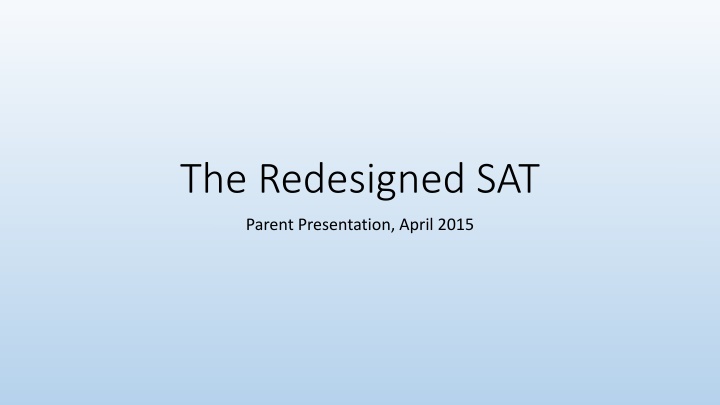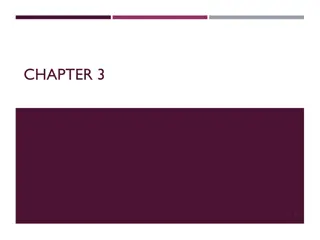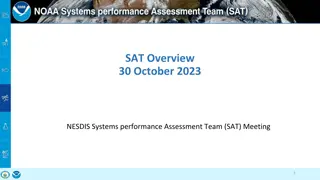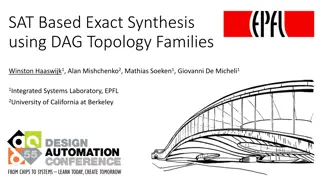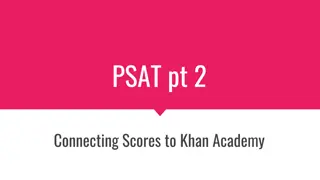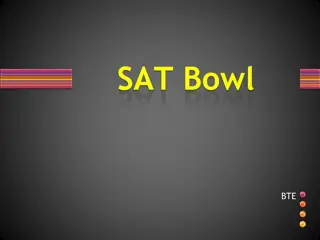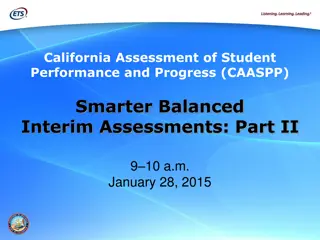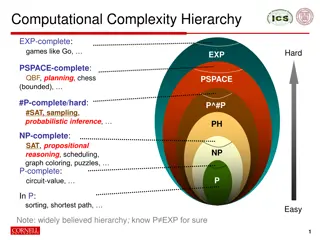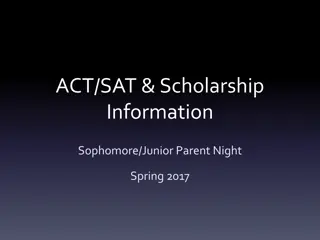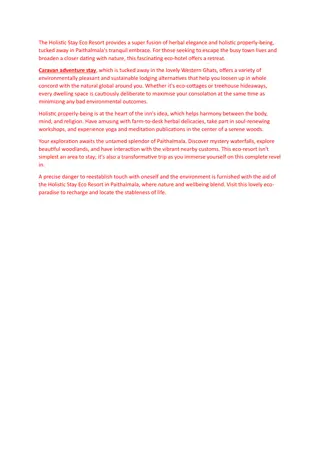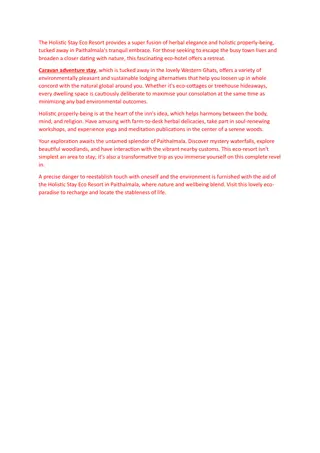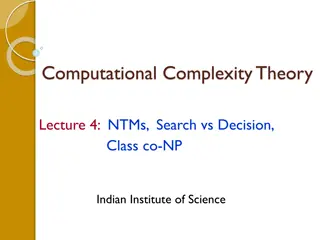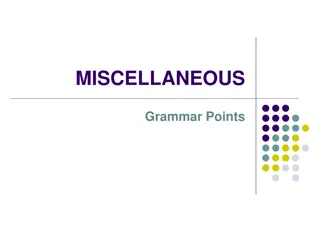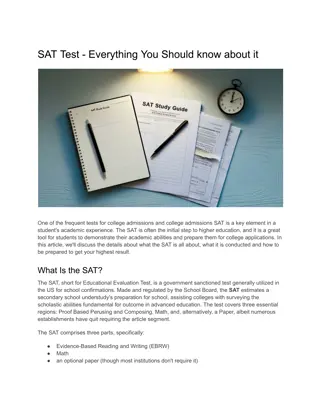The Redesigned SAT Suite of Assessments: Key Changes and Features
The College Board has introduced a new SAT Suite of Assessments aimed at aligning with essential college and career readiness skills. The redesigned SAT, PSAT/NMSQT, and other tests focus on evidenced-based reading and writing, math real-world applications, analysis in science and history, and US founding documents. Key changes include no penalty for wrong answers and a shift towards testing relevant words in context, command of evidence, and analyzing sources. The components feature reading passages, writing tasks, and a greater emphasis on critical thinking and intellectual skills.
Uploaded on Sep 25, 2024 | 2 Views
Download Presentation

Please find below an Image/Link to download the presentation.
The content on the website is provided AS IS for your information and personal use only. It may not be sold, licensed, or shared on other websites without obtaining consent from the author.If you encounter any issues during the download, it is possible that the publisher has removed the file from their server.
You are allowed to download the files provided on this website for personal or commercial use, subject to the condition that they are used lawfully. All files are the property of their respective owners.
The content on the website is provided AS IS for your information and personal use only. It may not be sold, licensed, or shared on other websites without obtaining consent from the author.
E N D
Presentation Transcript
The Redesigned SAT Parent Presentation, April 2015
Context Current versions of the PSAT/NMSQT and SAT have been in place since 2005 Approximately 93% of Conestoga s seniors take the SAT at least once before they graduate Approximately 90% Conestoga juniors take the PSAT/NMSQT in October of their junior year This serves as the National Merit Scholarship Qualifying Test (NMSQT) Administered on a Saturday to mimic SAT About 60% of sophomores participate The College Board has announced a new SAT Suite of Assessments Which will Focus on the knowledge and skills that current research shows are the most essential for college and career readiness and success: Redesigned SAT (April 2016) Redesigned PSAT/NMSQT (October 2015) New PSAT 10 (Feb/March 2016) New PSAT 8/9 (Fall 2015 and Spring 2016)
Current SAT vs. Redesigned SAT Overview Category Current SAT Redesigned SAT 1. Critical Reading 2. Writing 3. Math 4. Essay 1. Evidenced-Based Reading and Writing 2. Math (with and without calculator) Components 3. Essay (optional) Timing 3 Hours and 45 Minutes 3 Hours (Plus 50 Minute Optional Essay) 200 800 for each section 200 800 for each section Scoring 600 2400 total score range 400 1600 total score range **NO penalty for wrong answer** Essay: 6 24 total score range
Key Content Changes Relevant Words in Context Command of Evidence Essay Analyzing a Source Math That Matters Most Problems Grounded in Real-World Contexts Analysis in Science and History / Social Studies The Great Global Conversation and U.S. Founding Documents No Penalty for Wrong Answers
Component Features Reading Details: Test takers read passages (500 -750 words) and answer multiple choice questions, some paired with other passages or information graphics Passage topics include U.S. and World Literature, History / Social Studies, and the Sciences. Prior topic-specific knowledge is never tested The focus is on rhetoric, information and ideas, command of evidence, expression of ideas and synthesis Evidenced-Based Reading and Writing Writing Details: Test takers read passages (400 -500 words) and answer multiple choice questions The focus is on extended prose, conventions, sentence structure, expression of ideas, punctuation, words in context, command of evidence and effective use of language Puts the students in the active role of an editor who is improving a written passage ~ 100 Minutes
Sample Evidence-Based Reading and Writing Questions -Students read two passages- One difference between the experiments described in the two passages is that unlike the researchers discussed in Passage 1, the author of Passage 2: A: presented the birds with a problem to solve. B: intentionally made the birds aware of his presence. C: consciously manipulated the birds surroundings. D: tested the birds tool-using abilities. Sentence in Passage: To alleviate rush hour traffic jams in a congested downtown area, stoplight timing is coordinated. Which choice best maintains the sentence pattern already established in the paragraph? A: NO CHANGE B: Coordinating stoplight timing can help alleviate rush hour traffic jams in a congested downtown area. C: Stoplight timing is coordinated to alleviate rush hour traffic jams in a congested downtown area. D: In a congested downtown area, stoplight timing is coordinated to alleviate rush hour traffic jams.
Component Features Three Areas of Concentrated Focus: Heart of Algebra Problem Solving and Data Analysis Passport to Advanced Math Geometric and Trigonometric skills most relevant to college and career readiness Math ~ 80 Minutes Multiple choice and grid-in problems grounded in real-world contexts. Multistep and extended thinking problems. Mental math (including a Non-Calculator section)
Sample Math Question Aaron is staying at a hotel that charges $99.95 per night plus tax for a room. A tax of 8% is applied to the room rate, and an additional onetime untaxed fee of $5.00 is charged by the hotel. Which of the following represents Aaron s total charge, in dollars, for staying x nights? A: (99.5 + 0.08x) + 5 B: 1.08 (99.95x) + 5 C: 1.08 (99.95x + 5) D: 1.08 (99.95 + 5) x
Component Features Essay is Optional Requires test-takers to analyze 650-750 word document and explain how the author builds an argument, and to support their explanation with evidence from the passage. Tests reading, analysis, command of evidence, and writing skills The source text will change with every test administration, but the prompt will remain the same Scored based on a rubric Essay ~ 50 Minutes
Essay Sample -Reading Passage Provided- Write an essay in which you explain how Paul Bogard builds an argument to persuade his audience that natural darkness should be preserved. In your essay, analyze how Bogard uses one or more of the features in the directions that precede the passage (or features of your own choice) to strengthen the logic and persuasiveness of his argument. Be sure that your analysis focuses on the most relevant features of the passage. Your essay should not explain whether you agree with Bogard s claims, but rather explain how Bogard builds an argument to persuade his audience.
Redesigned PSAT/NMSQT Overview Category Redesigned PSAT/NMSQT 1. 2. Evidenced-Based Reading and Writing Math (with and without calculator) Components 2 Hours and 45 Minutes (shorter) Timing 200 800 for each section Scoring 400 1600 total score range Must be administered on a Wednesday (during school day) Scheduling Several Versions: PSAT/NMSQT (October 2015) PSAT 10 (Feb/March 2016) PSAT 8/9 (Fall 2015 and Spring 2016)
Additional Information. https://collegereadiness.collegeboard.org/
